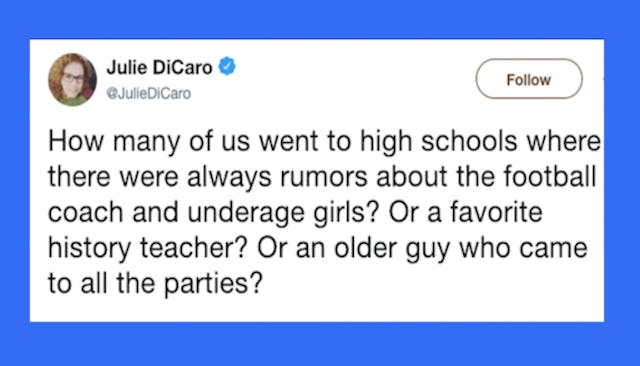Viral Thread Shows Just How Common Child Predators Are In Society

This viral thread is eye-opening
Amid the discussion surrounding Lifetime‘s new documentary, ‘Surviving R. Kelly,’ a viral thread prompted a very important question. How many of us have encountered or shrugged off rumors of child predators in our very own communities?
If you haven’t been watching ‘Surviving R. Kelly,’ do yourself a favor and watch it. His alleged victims deserve to have as many people hear their harrowing stories. It’s mind-boggling to see how easily he’s been able to prey upon young, teenage girls for decades — and even more upsetting to see how rape culture has enabled his abuse.
The dialogue surrounding Kelly on social media has brought forth many startling, interesting points. Sports writer Julie DiCaro sparked a discussion about child predators in our communities, asking women to share their stories.
“How many of us went to high schools where there were always rumors about the football coach and underage girls? Or a favorite history teacher? Or an older guy who came to all the parties?” she asks.
And it’s a valid question because you absolutely won’t find a woman alive who can’t answer it.
https://twitter.com/jetpack/status/1081396238128504832https://twitter.com/jetpack/status/1081381419941675008
The stories go on and on. Personally, I can think of more than a handful of creeps who fit this bill. The teacher who massaged the shoulders of female students sitting at their desks. The older guy who still came to high school parties years after he graduated. The male administrator who regularly policed the lengths of girls’ skirts and was the subject of much side-eye and speculation.
We all know them. We all live and grow among them. And rape culture enables them to continue their behavior — because a majority of these types of men won’t ever face consequences.
What’s even more enraging is how often, the young girls are blamed for the abuse that happens to them. The societal conditioning in regards to excusing this behavior or blowing it off altogether must stop.
Bottom line: a teenager is still a child — biologically and legally — and a child cannot consent.